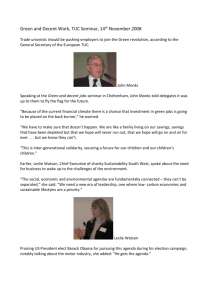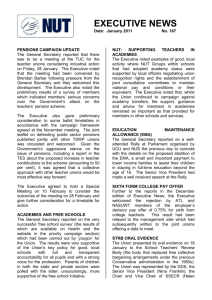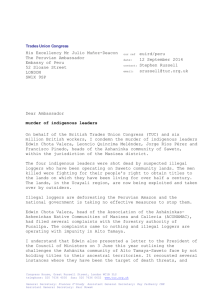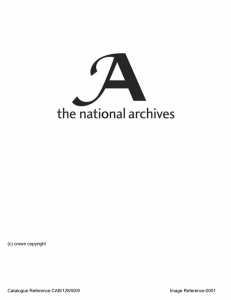(c) crown copyright Catalogue Reference:CAB/128/53/27 Image Reference:0001
advertisement
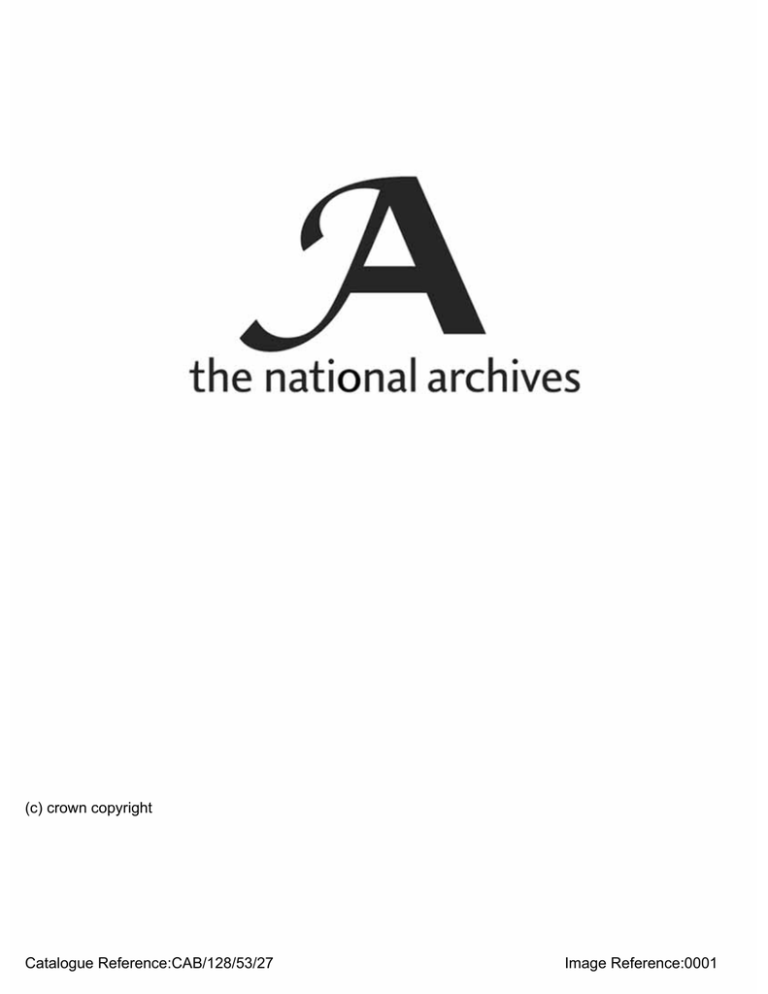
(c) crown copyright Catalogue Reference:CAB/128/53/27 Image Reference:0001 COPY NO CM(74) 3rd Conclusions 85 CABINET CONCLUSIONS of a Meeting of the Cabinet held at 10 Downing Street on THURSDAY 17 JANUARY 1974 at 10. 30 am PRESENT The Rt Hon Edward Heath M P Prime Minister The Rt Hon Sir Alec Douglas-Home M P Secretary of State for Foreign and Commonwealth Affairs The Rt Hon Lord Hail sham of St Marylebone Lord Chancellor The Rt Hon Anthony Barber M P Chancellor of the Exchequer The Rt Hon William Whitelaw M P Secretary of State for Employment The Rt Hon Lord Carrington Secretary of State for Energy The Rt Hon Robert C a r r MP Secretary of State for the Home Department The Rt Hon James P r i o r M P Lord President of the Council The Rt Hon Sir Keith Joseph M P Secretary of State for Social Services The Rt Hon Geoffrey Rippon QC M P Secretary of State for the Environment II The Rt Hon Margaret Thatcher M P Secretary of State for Education and Science The Rt Hon Gordon Campbell MP Secretary of State for Scotland The Rt Hon Peter Walker MP Secretary of State for Trade and Industry The Rt Hon John Davies M P Chancellor of the Duchy of Lancaster The Rt Hon Peter Thomas QC M P Secretary of State for Wales The Rt Hon Francis Pym M P Secretary of State for Northern Ireland The Rt Hon Ian Gilmour M P Secretary of State for Defence . The Rt Hon Maurice Macmillan M P Paymaster General The Rt Hon Joseph Godber M P Minister of Agriculture, Fisheries and Food The Rt Hon Sir Geoffrey Howe QC M P Minister for Trade and Consumer Affairs The Rt Hon Lord Windlesham Lord Privy Seal ALSO PRESENT The Rt Hon Humphrey Atkins M P Parliamentary Secretary, Treasury SECRETARIAT Sir Mr Mr Mr Mr Mr Mr John Hunt P D Nairne (Item 3) H F T Smith (Items 1-4) P Benner (Item 1) J A Hamilton (Items 5 and 6) D Evans (Items 2 and 3) R L Baxter (Items 5 and 6) CONTENTS '/ M Subject Page PARLIAMENTARY AFFAIRS 2. 1 Debate on Second Report from Select Committee on European Community Secondary Legislation 1 Nuclear Reactors 1 . FOREIGN AFFAIRS II Oil 2 Middle East 2 3. E U R O P E A N COMMUNITY AFFAIRS 3 4. NORTHERN IRELAND 4 5, ENERGY SITUATION Fuel Stocks 6. 5 INDUSTRIAL AFFAIRS The Miners' Dispute 7 :] PARLIAMENTARY AFFAIRS 1. The Cabinet were informed of the business to be taken in the House of Commons during the following week. The Cabinet were informed that there might be difficulties in connection with Thursday's debate on a Motion to take note of the Second Report from the Select Committee on European Secondary Legislation. The Report had been unanimous and it would not be easy to secure Parliamentary agreement to any significant departure from its proposals. One of the recommendations was that six days should be provided in each Session for debates on Community matters. It had been informally suggested to the Opposition that this should be accepted on the basis that three of the days should be provided by the Opposition from their Supply days. This suggestion would however only prove acceptable if the Government accepted in full all the other recommendations in the Report. This presented considerable difficulty because not all the proposals were in fact acceptable. In particular, it would be important not to provide anti-Marketeers with unnecessary opportunities for making difficulties, as, for example, would happen if a weekly slot were provided at Question Time to allow all Questions on Community matters - and not merely those now answered by the Chancellor of the Duchy of Lancaster - to be taken together as a block. Further informal discussion would take place with the Opposition and another report would be made to the Cabinet if necessary. It had not yet been finally settled whether 28th January should be a Supply day or whether it should be used for a debate on nuclear reactors on a Motion for the Adjournment. \\ On balance the latter seemed preferable. If a debate on nuclear reactors were deferred, it would be increasingly difficult to resist pressure to postpone it until after publication of the forthcoming Report by the Select Committee on Science and Technology; and this in turn would delay the Government in reaching urgently needed decisions. 1 2. THE FOREIGN AND COMMONWEALTH SECRETARY said that we had accepted the invitation of the President of the United States, Mr Nixon, to attend a meeting of oil consuming countries to be held in Washington on 11 February. All the member countries of the European Community would take part, and the Community itself would be represented by the Federal German Minister, Herr Scheel, who was the current Chairman of the Council of Ministers (Foreign Affairs), and the President of the Commission, M Ortoli. It would be important that the meeting should address itself as a matter of urgency to the acute difficulties facing many of the developing countries such as Jamaica and other Caribbean islands, who depended entirely on imported oil for fuel, and whose economies were already under severe strain. THE FOREIGN AND COMMONWEALTH SECRETARY said that the American Secretary of State, Dr Kissinger, who was in the Middle East, had evidently encountered difficulty in his efforts to obtain Egyptian and Israeli agreement on a formula which would lead to the separation of their armies. It now seemed, however, that agreement might be reached in the fairly near future. If so, this would be the right moment to lift our arms embargo and to permit the delivery of arms for which contracts had already been concluded. In the matter of new contracts, we would revert to the position which existed before the outbreak of the October war, and any proposals would have to be considered on their merits and in the light of the existing situation. The Cabinet Took note of the statements by the Foreign and Commonwealth Secretary, 3. THE FOREIGN AND COMMONWEALTH SECRETARY said that at the Council of Ministers (Foreign Affairs) Meeting on 14/15 January there had been a further full discussion of the proposed Regional Development Fund (RDF) but no agreement on the central question of the size of the Fund. The Commission had proposed formulae under which the beneficiary countries including the United Kingdom would get the same net receipts from a small Fund as from a large one. But this was not acceptable to some other countries whose rebeipts would be reduced; and the majority view was that a solution must be found on the lines of the original Commission proposal. The question was therefore whether the German Government would be able to accept a substantially larger Fund than it had so far indicated; the issue was closely involved with internal German politics. In discussion it was argued that the Council Meeting had shown a clear acceptance by all member States that any compromise solution must accord to the beneficiary States the same net benefits as the original Commission proposals. It had been agreed that there should be a further meeting of the Council on 30 January which might be preceded by a preparatory meeting at Ministerial level; it was not yet clear whether the German Government would be able by then to shift its ground sufficiently to make agreement possible. THE PRIME MINISTER, summing up the discussion, said that the establishment of an RDF on satisfactory terms remained a prime objective. We should continue to pursue this vigorously within the Community and for the time being maintain the link with the development of an internal Community Energy Policy. The Cabinet noted that some other countries were maintaining similar links between progress on the RDF and areas of Community work of particular interest to them. The Cabinet Took note with approval of the Prime Minister's summing up of their discussion. ' 3 4. THE SECRETARY OF STATE FOR NORTHERN IRELAND said that in his campaign to win Protestant support, Mr Faulkner had reason to be pleased with the events of the past week. He had held a successful meeting in Dublin with the Prime Minister of the Irish Republic, Mr Cos grave. The Irish politician, M r Kevin Boland, had been unsuccessful in his court action in Dublin where he had sought to prove that the Sunningdale agreement was in conflict with the constitution of the Republic, and in particular that the Sunningdale declaration that the Irish Government accepted that the constitutional position of Northern Ireland could not be changed without the consent of the people of Northern Ireland was unconstitu­ tional. The political struggle in Northern Ireland continued, and on the previous day some of Mr Faulkner's leading !opponents, including Dr Paisley and Mr Craig, had succeeded in mounting a formidable public demonstration including the manning of 50 road blocks and a large meeting in Belfast. They had declared their intention of holding a further mass demonstration on 22 January, in order to prevent members of the Assembly from entering Stormont to attend its next meeting. Measures were being taken to frustrate this attempt. A meeting of the Standing Committee of the Unionist Party was to be held the following week to choose a Leader of the Party in succession to Mr Faulkner. The new Leader would presumably make an immediate attack on Mr Faulkner and his policies, and this might well force Mr Faulkner to resign from the Party and to form a new one; 1 The Cabinet Took note of the statement by the Secretary of State for Northern Ireland. 5. THE SECRETARY OF STATE FOR ENERGY said that the levels of fuel stocks for power stations were now higher than had been expected. Because of warm weather and because of the satisfactory public response to Ministerial appeals for savings in domestic consumption, the coal stocks at power stations had declined in the previous week by only 200, 000 tons instead of 500, 000 tons as expected. It now seemed possible that the coal stocks by the end of March would still amount to 11 million tons. If it became necessary to; cut down on oil consumption, that figure might be reduced to 10 million, and bad weather could cause a further reduction to 9 million tons, 8 million, of which would be held by the Central Electricity Generating Board (CEGB) and 1 million by the National Coal Board. Though the figures so far were satisfactory, a number of uncertainties remained. The industrial action by the Associated Society of Locomotive Engineers and Firemen (ASLEF), which had not yet affected the transport of coal to power stations, could be intensified; so could the action by the National Union of Mineworkers (NUM); and there was the possibility of industrial action by gas workers. The weather would continue to be a major uncertainty. The stocks of fuel oil, which for four Weeks had remained steady at 49 days' supply, were likely to begin to decline towards the critical figure of 45 days. Nevertheless there was room for cautious relaxation of the three-day week. He recommended that, as an immediate step, more electricity should be made available for the manufacture of steel. At the same time he should consult the Confederation of British Industry (CBI) about the possibility of further relaxation to be introduced in the following week. The CEGB believed that it would be possible to introduce four consecutive days of electricity consumption a week, and that this would give a better spread of consumption during the week than the CBI proposal for overlapping the two periods of three-day electricity use to avoid Saturday working. The presentation of the easing of the restrictions might be difficult. It would be necessary to rebut accusations of a sudden change in policy and to continue to appeal for domestic savings, which on 15 January had risen to 23 per cent. THE SECRETARY OF STATE FOR E M P L O Y M E N T said that in theory it would be possible for ASLEF to interrupt the transport of coal and oil by rail. In practice ASLEF activities had produced no significant effect on the transport of oil and coal so far; their members had proved less militant than they had expected; and they might find it difficult.Jo resume industrial action. As regards the gas workers, the Pay Board was about to rule on their claim for anomaly treatment, and there was a good chance of a settlement that would be accepted. In discussion it was argued that the CBI believed whether rightly dx wrongly that its members were at present managing better than expected under the three-day week. Any relaxation of the restrictions should take account of the dangers of further industrial action, colder weather and further cuts in oil supplies. One possible strategy for the NUM would be to wait until stocks had declined to the minimum and then call an all-out strike. On the other hand it was argued that a four-day week would produce great benefit to the economy and should help to maintain overseas confidence in the pound; the latest figures released by the Bank of England were alarming and there were daunting estimates of , the balance of payments deficit for 1974. The introduction of a four-day week might not be, however, the most effective relaxation. It would be possible to introduce greater flexibility into the system by concentrating on the needs of particular industries and making exceptions in favour of those that were judged most essential. It would be possible to extend the scheme already being applied to continuous-process industries and allow firms to consume a fixed percentage of their normal supplies of electricity, starting with say 65 per cent and increasing to 80 per cent; such a system was said to be difficult to enforce, but it had worked successfully in Northern Ireland, Whatever arrangements were made should allow for the possibility of Saturday working by those who were willing to do so. It would also be necessary to take account of the effects that different kinds of relaxation might have on the payment of social security benefits. A l l these possibilities should be carefully discussed with the CBI. II As regards presentation, it was argued that the change could be attributed to the unexpected good weather and the high level of domestic savings, which had made it possible for the CEGB to revise its advice to the Government. The Government would have to make its statement as soon as the fuel stocks were announced; it would not be possible to wait for the next stage in the ASLEF dispute. It would be better at first to avoid any mention of the possibility of a four-day week, since this would immediately receive headline publicity; they could say that the four-day week was an option that might be possible but could not be adopted on the strength of one week's figures. In order to avoid unnecessary controversy, it would be better not to make the announcement in Parliament, THE PRIME MINISTER, summing up the discussion, said that the Secretary of State for Energy should make the announcement as soon as the fuel stocks were published. Rather than refer to a "relaxation" which could give a false impression, he should say that the advice of the CEGB indicated that more supplies could be made available to industry. This would make more electricity available for steel making; other possibilities were to be discussed with the CBI. If the Government were accused of a change of front, the answer was that common prudence had required them to plan for the wors4 and it was possible to increase supplies when the worst did not occur. Relaxations in the three-day week should be discussed with the CBI as soon as possible and then explained to the Trades Union Congress. One possibility would be to change from three-day working to four­ day workingi others would be to introduce greater flexibility; to exempt some firms; or to allow firms to administer percentage cuts. The Cabinet Took note with approval of the Prime Ministers summing up of their discussion. 6. The Cabinet considered the industrial dispute in the mining industry. Their discussion and the conclusions reached are recorded separately. Cabinet Office 17 January 1974 t COPY NO CABINET V .\ / CONFIDENTIAL ANNEX CM(74) 3rd Conclusions, Minute 6 Thursday 17 January 1974 at 10. 30 am INDUSTRIAL AFFAIRS The Miners Dispute 1 Previous Reference: CM(74) 2nd Conclusions, Minute 6 THE PRIME MINISTER said that after the last meeting of the Cabinet he had invited the Trades Union Congress (TUC) to meet him. They had talked about the meaning of the assurance that the TUC had offered. He had suggested to them that their undertaking not to quote any exceptional settlement with the National Union of Mineworkers (NUM) in support of other settlements would not prevent other unions from seeking exceptional treatment on other grounds. They admitted that this was so but said that they had no power to prevent it. They were not asking the Government to allow Stage 3 to be broken, and they hoped that the Government would not ask them to undertake that Stage 3 would be observed. When he met them again on Monday they had gone further and had undertaken that the TUC itself would not press the Government to make special arrangements to meet any other claims. When asked, however, to undertake that nc union would press for exceptional treatment they could only say that in practice the present economic situation would keep wage awards below the Stage 3 levels. He had then had a private talk with Sir Sidney Greene and Mr Murray about the possibility of an approach by the TUC to the NUM, but after consultation with other members of their delegation they declined to make such an approach unless the Government could promise that if they came back with a proposal for a settlement beyond Stage 3 the Government would consider it. They had used great ingenuity in trying to persuade the Government to agree that in some circumstances the NUM might be allowed a settlement beyond the Stage 3 limits. They agreed that it would be wrong to give carte blanche "to the N U M . They said they would support only a "reason­ able settlement" but could not define what would be reasonable. The meeting ended without agreement: and on the assumption that the TUC representatives would meet the Government again if the results of their conference on Wednesday suggested that such a meeting would be worthwhile. 1 THE SECRETARY OF STATE FOR E M P L O Y M E N T said that at the special conference of the TUC held the previous day, M r Murray had gone on record with a number of statements that he had previously made in private to Ministers. He had asked the conference to agree that the miners were a unique case; that they deserved exceptional treatment this year only; and that the TUC should not support any other claims for exceptional treatment. Unfortunately, in seeking agreement to these helpful propositions he had found it necessary to offer the support of the TUC for the miners' case, and this part of his speech had received the most publicity. Few spoke against him and the upshot was that the assurance given by the TUC to the Government was supported by the conference with only 3 votes against. A resolution that had been proposed in favour of protests and demonstrations against the 3-day week was left undiscussed. The readiness of the unions to support the TUC formula could be seen either as an advance or as a demonstration of its lack of content. The Government must now decide whether to meet the TUC again. The most that the TUC could conceivably be persuaded to offer would be an undertaking along the following lines: i. They accepted the miners as a distinctive and exceptional case this year for whom some reasonable and limited addition to the current offer would be justified: the addition would be confined to those working underground. ii. The TUC would require all other member unions to refrain from seeking, or using industrial power to press for, special treatment during the current pay round. iii. If any member union sought to do so, the TUC would dissociate themselves from the action by the union concerned. If the TUC gave an undertaking on these lines, isolating the case of the miners, it must be recognised that the consequence would be a settlement for the miners beyond the Stage 3 limits. Alternatively the Government could deliberately put an end to the TUC initiative ­ for example by asking them to undertake to denounce any other II ­ union which took industrial action, or to give some undertaking to recognise Stage 3. The proposal that had recently been produced by M r Roy Mason was only a variant of the earlier proposal to take account of waiting time, and he did not think that it would help. The time might come when offers of increased pensions or special provision for health could be helpful; and other offers might be possible which were not technically in breach of Stage 3, though the public might think so. In the long run it was to be hoped that the talks on the future of the industry would produce a more permanent arrangement by which the pay for the underground workers would be fixed separately at a higher level than for other National Goal Board employees. The Pay Board report on relativities would be available by the end of the week, and ought to be published at the latest by Wednesday 23 January. It would deal in general terms with the principles and procedures by which Pay Codes might in future be amended to take account of special cases. Although the Press would seize on it as offering a way out for the miners, it would not in practice be possible or timely to try to take decisions on the future of Stage 3 by that date. In discussion it was noted that with the exception of certain craftsmen few of the miners were losing much pay as a result of their overtime ban, and only the maintenance workers were in breach of any agreement. It was difficult to bring pressure on the miners, although it was possible that when the approved offer within Stage 3 became available on 1 March some miners might become more willing to settle. Another possible course would be for the Government to change the situation by introducing a quick move from Stage 3 to a new and more severe Stage 4, which would still provide for some exceptional treatment for the miners. In order to avoid creating further anomalies it would however have to be provided that all groups would be allowed to reach Stage 3 settlements by a given date, such as 1 March, but that any group that failed to do so should be subject to the more stringent provisions of Stage 4. This would however take time to work out. In further discussion it was argued that the undertaking mentioned by the Secretary of State for Employment as the most that the TUC could be persuaded to give would not be enough to justify the Government in permitting an exception to the Stage 3 Pay Code. The TUC could not in practice keep such an undertaking and the supporters of the Government would find any exception to Stage 3 very difficult to accept. In June 1969 the then Government had accepted undertakings at least as specific from the TUC as a reason for withdrawing legislation and in so doing it had lost the reality of power. Similarly acceptance of TUC undertakings now might transfer the reality of power to the N U M . Admittedly the public might expect the Government to meet the TUC once more to discuss the outcome of the TUC conference, but the Government could use the meeting as an opportunity to break off discussions on terms that could be explained publicly. On the other hand it was argued that the aim of the TUC would be to avoid a break, and that if the discussions dragged on inconclusively the public would begin to lose patience. The talks had already reached a natural conclusion at which a clean break would be better. Indeed rather than meet the TUC again, it was arguable that the time had come to make one more effort with the NUM. They should be told that all other unions were settling within Stage 3. If they were to turn down the settlement they would be seen to be the only union that was not behaving reasonably in the public interest. Such an appeal could only be made by the Prime Minister. THE PRIME MINISTER, slimming up the discussion, said that those who had been engaged in the talks with the TUC and the NUM needed a period of concentrated thought to work out all the stages of further discussions. It would be wrong, therefore, to hold any­ meeting in the current week with the TUC or the NUM. If an appeal were made to the NUM it would have to take account of the; whole situation, including the talks with the TUC and the provisions of the report on relativities that was about to be published. The discussion could become extremely complicated. He would like to devote the afternoon and the next day to further study of the arguments for meetings with the NUM or TUC and of the possibilities that might be raised in discussion so that the Ministerial team could not be taken unawares. The Cabinet Took note, with approval of the summing up of their discussion by the Prime Minister. Cabinet Office 18 January 1974 II" 4
